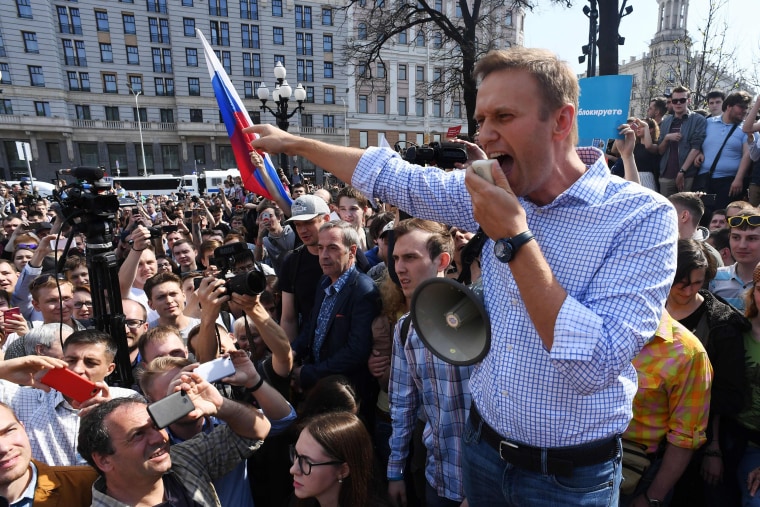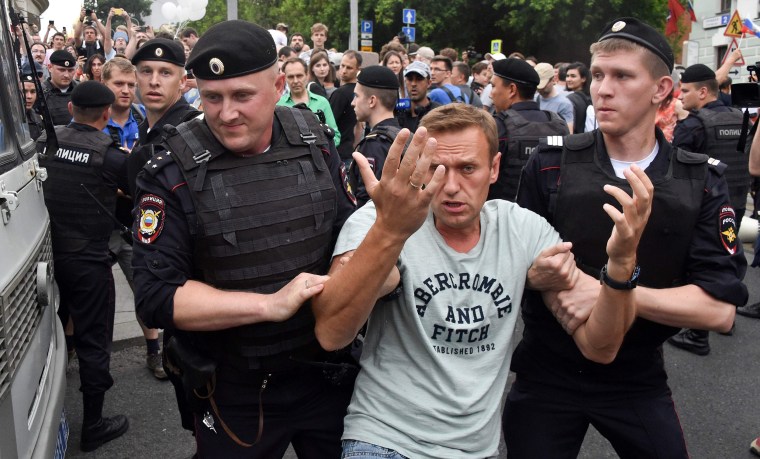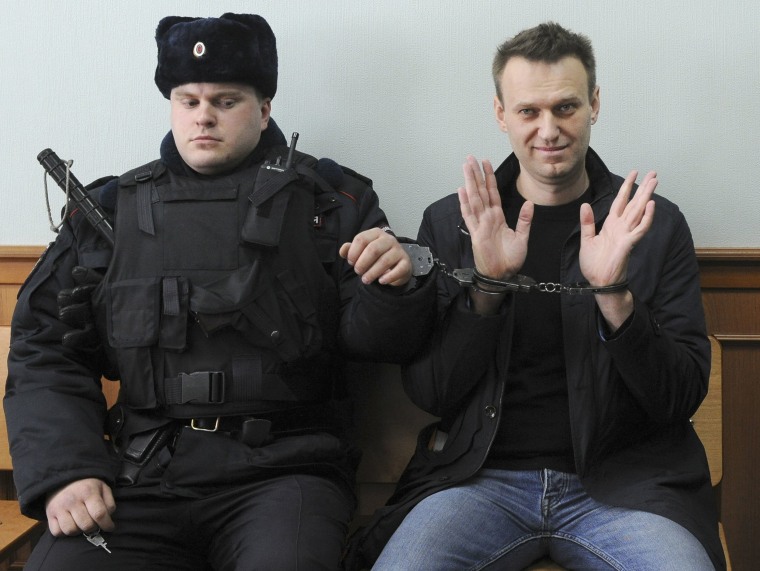MOSCOW — The most prominent opposition figure in Vladimir Putin's Russia is fighting for his life. But who is Alexei Navalny and why does it matter that he is now in a coma in a Siberian hospital?
Navalny has led nationwide protests against the authorities, repeatedly challenged members of the president's United Russia party and set up a network of campaign offices across the country.
His anti-corruption investigations and slickly produced videos and social media sites about them have attracted millions of readers and viewers. Thousands have attended his protest rallies.
But his uncompromising politics have come at a cost for Navalny, 44, a lawyer, blogger and politician, who has frequently been detained by the law enforcement and harassed by pro-Kremlin groups.
Now he is being treated at a hospital in the Siberian city of Omsk after he fell ill on a flight back to Moscow from Tomsk, another city in the province. His spokesperson, Kira Yarmysh, suggested he had been poisoned before boarding the plane Thursday morning.
Doctors at the hospital who said Thursday that poisoning was being investigated announced Friday that tests had found no traces of poison. Navalny’s supporters say his family has still not been informed of his diagnosis.

A year after Navalny became a Yale World Fellow in 2010, he set up the Anti-Corruption Foundation, which focused on investigating and exposing sleaze among government officials.
One of the things the organization does is "dig up dirty stories on people who maybe didn't pay their taxes, or maybe their tax returns are not cognizant with their stated salaries," Emily Ferris, a research fellow at the Royal United Services Institute think tank, said in an interview.
"Maybe they're living in sprawling mansions when they are living on modest state pensions," she said.
Download the NBC News app for breaking news and politics
As well as criticizing corporations, Navalny used his blog in 2011 to urge readers not to vote for Putin's United Russia, which he called a party of "crooks and thieves."
Although the party would go on to win the election, Navalny would speak out against the Russian leader at a series of protest rallies after the vote.
As his profile rose, so did interest from the authorities.
In 2013, he was sentenced to five years imprisonment for embezzlement in the city of Kirov, and he was briefly jailed before authorities allowed him out to run for mayor of Moscow — a campaign that proved unsuccessful.

His conviction was overturned by the Russian Supreme Court following a judgment by the European Court of Human Rights; he was convicted for a second time after a retrial in February 2017.
The following month, he was attacked with green dye. He laughed off the attack by tweeting that he looked like Jim Carrey's character in "The Mask." No one has been arrested in connection with the incident. Navalny said he believed the presidential administration was involved. The Kremlin has always denied any involvement in political violence.
But in an Instagram post in May 2017, he said he had surgery after the dye caused chemical burns in his right eye.
While his presidential bid may have been thwarted, Navalny continued his investigations. Last month he had to shut the Anti-Corruption Foundation because of a financially devastating lawsuit filed by Yevgeny Prigozhin, a businessman with close ties to the Kremlin.
Ferris said that with protests taking place in the fareastern Russian city of Khabarovsk and a feeling in other provinces that "Putin has kind of forgotten them," Navalny's work could make it difficult for Putin and his party in next month's regional elections and next year's parliamentary elections.
Navalny and his allies were in Omsk to try to increase support for candidates they support in Siberia.
While she would not speculate on what happened to Navalny, Ferris said, "The information that he's digging up and makes available can make things complicated."

It is unclear how Navalny became ill — his supporters claim he has been poisoned, the doctors where he is being treated say he wasn't. If it is proven, he would not be the first Russian dissident to suffer such a fate.
Should that be confirmed, one question remains: Who would want to silence him?
Although Putin’s regime appears from the outside to be a monolithic top-down power structure, it is more accurately understood as an ad hoc system of competing interests that Putin loosely manages.
Various players in Putin’s regime are litigious, and some of them violent, in their defense against allegations of corruption from investigative journalists and opposition activists — and Navalny has made his name acting as a hybrid between the two.
Over the past decade, Navalny has made many enemies by uncovering acts of official corruption. His latest target is Prigozhin, known in the West as the man behind the infamous “troll farms,” and for a network of news outlets that go far beyond what the Russian state media say in support of the Kremlin.
The U.S. government says Prigozhin is the financier behind the Internet Research Agency. The Department of the Treasury sanctioned him last year, accusing him of meddling in the 2018 U.S election.
Prigozhin is far from the only ranking member of Putin’s entourage that Navalny has crossed during his career. In 2018, he even challenged Putin directly in a bid for the presidency that was blocked by the Central Election Commission.
His bid for Russia's top job caught the Kremlin unaware, and he was eventually banned from running because of a conviction by a Russian court of embezzlement — something he has categorically denied while claiming that his legal troubles are reprisals for his criticism.
The presidential bid was the logical peak to a career that began almost a decade earlier when he began as an internet-savvy blogger covering corruption in some of Russia's largest state-controlled corporations, questioning the finances of banks and oil companies and challenging them in court.
Navalny’s camp is clear on where they place the blame for his poisoning however, with spokeswoman Yarmysh tweeting Thursday: “This is Putin.”
"Whether or not he gave the order personally, the blame lies with him," she said.
Matthew Bodner reported from Moscow and Henry Austin from London.
The Associated Press contributed to this report.